- Masters Of War/Casting My Spell (Stateside SS 408) 1965
- Talismen's Style (RCA Italiana) 1966
The Talismen
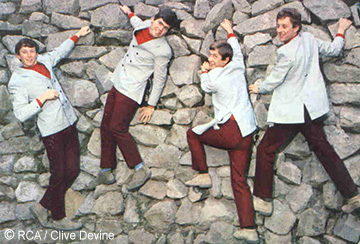
CHELTENHAM
Updated September, 2018
Trevor Cook drums
Clive Devine bass guitar, vocals
Steve Outhwaite guitar, vocals
George Rainsford guitar, vocals
Alan "Digger" Dike guitar, vocals (joined in 1965)
Laurie Jeffs guitar, vocals (joined in 1966)
"TALISMEN TOP THE POLL"
The Talismen won top spot in the first Midland Beat magazine popularity poll that was held in 1964. The poll was meant to highlight the most popular performing groups in the West Midlands so a high placing would benefit a band considerably in terms of publicity and the extra bookings that would result from it. Funnily enough though, The Talismen were not from Birmingham but were based in Cheltenham - quite some distance south of the Midlands area!
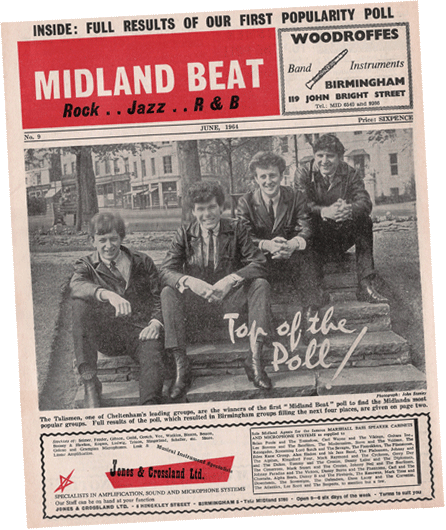
How then did the group win the Midland Beat poll and qualify to be listed on the BrumBeat web site? Chris Stanbury has written the story of The Talismen and the Midland Beat poll mystery that can now be read as follows:
RISING from the ashes of the Cliff Richard and The Shadows inspired "Johnny and The Falcons", the Gloucestershire based four-piece recording band The Talismen, were just about the biggest thing in Cheltenham during 1965 since rhythm & blues fanatic Brian Jones had headed for London to form the Rolling Stones a couple of years earlier. Comprising of Clive Devine (bass & vocals), Trevor Cook (drums), Steve Outhwaite (guitar & vocals) and George Rainsford (guitar, harmonica & vocals), these four guys had "being cool" down to an art form!
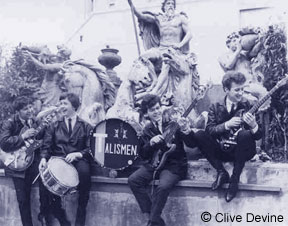
Following guitarist Steve's return from Liverpool University saying he had seen the future of British music with Merseyside acts such as The Beatles and The Searchers through to The Undertakers and The Mojos. Steve knew with the arrival of these bands that the cards of moody young singers like Shane Fenton, Adam Faith and Marty Wilde etc. were well and truly marked.
After rehearsing The Searchers' debut chart success of 'Sweets For My Sweet' to near perfection, the decision was made. Overnight, out went both Johnny and the old group image of short hair and suits plus those twangy old Shadows hits, and in came smart leather jackets, mop top hair do's, current chart guitar and vocal harmony hits - and a new name. The Talismen were born.
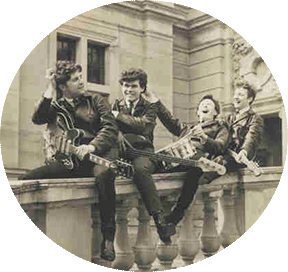
By early 1964 and working their way round the Cheltenham pub circuit as best they could, it wasn't long before the fledgling Talismen came to the attention of local teenage impresario, Roger Kendrick. Whilst not being particularly music oriented himself, Kendrick was full of good money making ideas and our wanna-be pop stars were up for his ideas too. Within a short space of time Kendrick, now acting as unofficial group manager, had the four-piece working on the next level of bookings, hotels, social clubs and their prestigious local town hall.
On occasions the group might also find themselves as the headlining act at a Kendrick promoted event promoted locally around the Cheltenham area. Now travelling from booking to booking in the relative luxury of a Ford Thames 15cwt van, The Talismen's gig turf gradually expanded not only county wide but into the neighbouring counties of Wiltshire, Oxford, Hereford and Worcester. Eventually, the beckoning hand of Birmingham would welcome them onto their pub circuit.
Kendrick, keen to expand his own promotional ideas as well as those of the group, soon convinced local pub landlord Harry Webley that what Cheltenham really needed was an equivalent of Liverpool's Cavern Club. Within a few weeks, funded by Talismen cash, The Grotto Club at the Wheatsheaf Inn in the town's Old Bath Road was built in the pub's little used skittle alley. Despite objections from the surrounding neighbourhood an entertainment licence was granted and the club opened. From day one the club took off big time with keen music-loving teenagers eager to see the latest local and regional happening groups and singers of the day.
"Imagine the ensuing publicity"
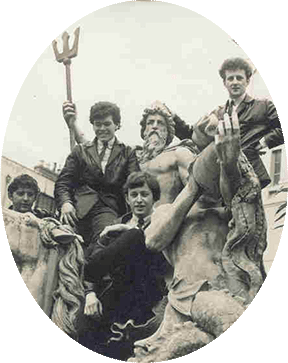
With The Talismen now working the pubs and clubs of the Birmingham area as part of their regular three or four night gig run of bookings, the Svengali like mind of Kendrick started to move into over-drive. During their, by now, frequent visits to Britain's "Second City", The Talismen found themselves working on the same circuit as acts including The Rockin' Berries, Carl Wayne and The Vikings and The Spencer Davis Group. Venues visited often included The Morgue, The Kings Head and the Hen & Chickens on the Hagley Road, Silver Blades Ice Rink, and The Moat House in the city centre plus the Oldhill Plaza and Top Spot in Erdington.
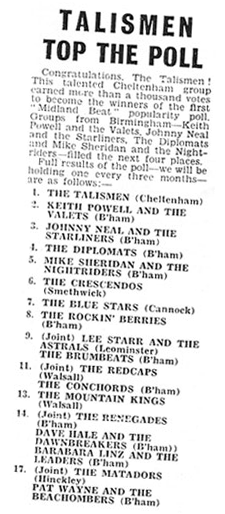
It was whilst the group were playing at the Top Spot that Denny Laine and Ray Thomas of The Moody Blues taught Talismen guitarist George Rainsford how to play harmonica R & B style. Venues like these would became both very familiar and invaluable to the group during that long hot summer of '64. It was just one of those nights in Birmingham that several of the Talismen members began thinking there might be more to group life than simply arriving back home at dawn most mornings having just slogged up and down the A38 all for a few pounds each.
Whilst playing in the Birmingham area one March weekend of 1964, bass player Clive Devine purchased a copy of the Brummie based magazine, Midland Beat, which was full of useful info on the venues and groups from all over the midlands area. Taking the sixpenny magazine back to Cheltenham to show Roger Kendrick some useful gig leads, the erstwhile Kendrick picked up on the fact Midland Beat were planning to run a popularity poll of local groups.
"Imagine the ensuing publicity" Kendrick suggested to the group, should the Talismen to win such a poll. By September of that year, after purchasing dozens of copies Midland Beat, a very successful vote capturing campaign was organized at The Grotto Club and across Cheltenham.
By June 1964 a carefully posed photo of The Talismen adorned the front cover of edition number nine of the Midland Beat. The magazine proudly heralded them as winners of their first popularity poll. Within a short space of time bookings rolled in from all over the Midland area for our Gloucestershire four-piece by the score - job done. By the autumn of '64 the group had worked with enough record company signed acts around the Birmingham area to know it was a case of not what you knew about he industry but rather who you knew within it.
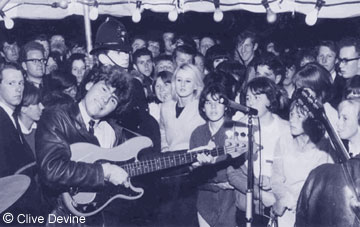
Steve & Clive of the group sat down with their manager, Roger Kendrick, and hatched a sure-fire plan for success. By now the group was aware that The Grotto Club was beginning to attract the attention of not only Birmingham based groups and entertainment agents willing to trade off Talismen gigs for engagements in their own areas but London agencies wishing to work on the same basis. Feeling perhaps a nightly London commute of a two hundred-mile round trip was a step too far at this stage, the Talismen agreed that Kendrick would take the group's three-song tape recording into London record companies to try and secure the group a recording contract.
Following initial rejections from record companies using the direct approach tactic, Kendrick eventually hit on the idea of contacting one of the agents keen to get their acts into the Grotto Club. Along with Robert Stigwood, Don Arden and Tito Burns, the Arthur Howes Agency were about as big as you could get in the world of group management and package tour promotion during the mid-sixties.
Kendrick decided after a quick listen to the group's demo material and Arthur Howes made a quick phone call to the now London domiciled American record producer of The Who and The Kinks, Shel Talmy. Keen to return home deal in hand, Kendrick then hot-footed it to Talmy's West End office where he successfully negotiated an audition for his group from Cheltenham with one of the industry's most sought after producers.
"Casting my spell"

Following the hastily convened 2 Eyes Coffee Bar audition in Tin Pan Alley, the group signed a production deal with Talmy that would soon find manager Roger Kendrick looking for another act to manage. Talmy insisted he managed and produced The Talismen as part of an all-inclusive deal for the four-piece beat group. Eager to make big it in the pop business, the group reluctantly agreed to the deal on offer. A stranglehold deal that certainly would not stand any type of court scrutiny in this day and age!
A frosty December day during 1964 saw The Talismen record their debut single at IBC Studios in Great Portland Place, London for an, as yet, unknown record label. The legendary engineer Glyn Johns took charge of the recording desk for the two song, six-hour session. Quick to pick up on what was breaking back in the States, Talmy had already instructed the group to work out an original arrangement for 'Masters Of War' from Bob Dylan's top selling album "The Free Wheelin' Bob Dylan". The session went so well that day the group was not only able to complete Masters Of War - a live set favourite, 'Casting My Spell' went into the can as well.
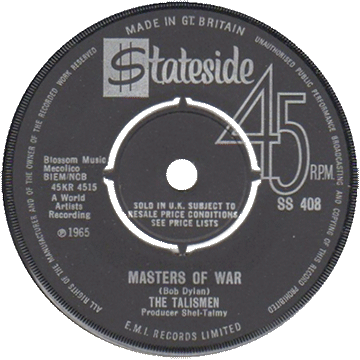
It is widely thought The Talismen were the first ever group to rearrange and cover a Dylan song on vinyl - possibly beating The Byrds with their offering of Mr Tambourine Man by some two or three months. Future Led Zeppelin guitarist and famed studio session man, Jimmy Page, would later add harmonica to the group's studio efforts, making the single a very rare record collector item in years to come.
Following the single's release on EMI's Stateside label during April/May of 1965 Masters Of War began to receive it's fair share of radio air-play. The Talismen appeared on an EMI sponsored in-concert style live show for Radio Luxembourg and the popular pirate ship Radio Caroline gave the group's Bob Dylan song regular spins during their round the clock broadcasting schedule.
Sadly, due to the single's non-chart appearance the group narrowly missed out on both an appearances on ITV's premier Saturday evening pop show, "Thank Your Lucky Stars" and a multi-date pop package tour taking place that spring. Despite missing out on chart status the group continued to tour regularly around the Midlands and the North West of England.
Thinking perhaps The Talismen might benefit from some performance sharpening backing gigs, Talmy arranged for the band to back an up-coming singer of the day, Bobby Shafto on a brief run of West Country bookings. Following the Shafto engagements Talmy then set about organising a trip to Europe for the group. Using his extensive network of contacts their new manager then set up a month long residency for the boys during September '65 at The Hotel International in Zurich, Switzerland.
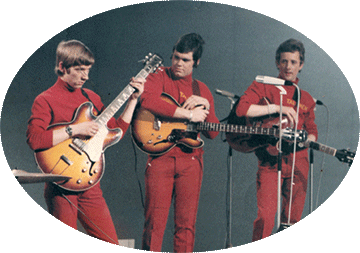
The Swiss residency proved to be a steep learning curve for the group with the boys having to quickly learn how to vocally pace their act in order to sing six night a week and still speak the following day! Working their way through early hotel residency vocal problems the group soon found themselves at a new performance level and ready to move on.
Despite the offer of a second single to be produced by Talmy back in London for UK release, the group opted for a trip to Italy - a decision perhaps the group would later question. The Italian deal would lead to the group being offered a more or less permanent backing group job for an Italian star complete with an album deal in Rome.
Somewhat annoyed at the group's head-strong Italian deal decision, Talmy announced he would have nothing further to do with the group and tore up his agreement with the Talismen and they were now without the management hand of either Kendrick or Talmy. This meant there was nobody around to look after the group's business affairs. This situation, as the group would soon find out for themselves, the Italians would soon exploit to their own advantage.
"Talismen Style"
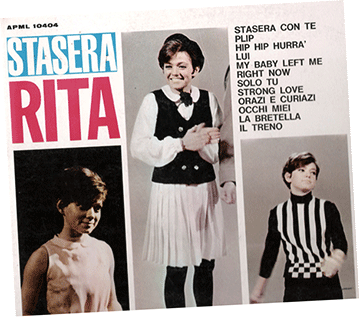
Part of the Italian deal would see The Talismen relocate to Rome where they would be THE British backing group for the teenage Italian star, Rita Pavone. Rita's business manager, Teddy Reno, now took over the management of the Talismen and they were to become part of his plan to make Rita a big star in both Britain and America. Following a two week return to Cheltenham to organise Italian work permits etc, the group's original lead guitarist, Steve Outhwaite, left the group to be replaced, with mixed fortune, firstly by Alan "Digger" Dike and then Laurie Jeffs.
Despite receiving little financial reward for their efforts and often having to resort to eating in their record company's canteen in order to survive, 1966 would see The Talismen blossom into stars of the Italian concert and TV scene as they toured to promote their hastily recorded RCA ten-track album "Talismen Style".
Despite a much talked about new Italian song for the boys, the album contained nothing new from the group and was simply an RCA promotional tool of cover versions that included Monkey Time, I'll Be Doggone and Spanish Harlem. However, regular appearances with and without Rita Pavone did give The Talismen their fifteen minutes of fame as they became Italian household names and were stars at last!
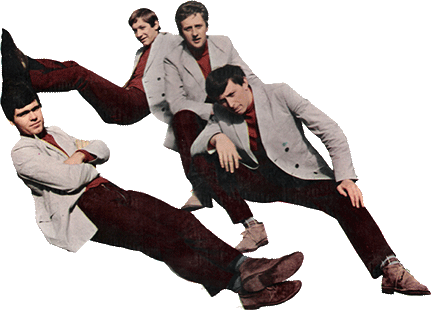
The following year, with the group's one album RCA recording deal complete and their contracted Rita Pavone period at a close, the empty pocketed group headed for home via one last gig in Switzerland and, hopefully, fresh challenges back in England. On their arrival back in Britain the group were shocked to find the beat boom more or less over - flower power and psychedelic music was then the name of the game.
Totally disillusioned by the British music scene of the day, the group reluctantly agreed to go their separate ways. Sadly, at this point the Talismen story came to an abrupt halt - and many would say a somewhat premature end to an otherwise unbelievable career.
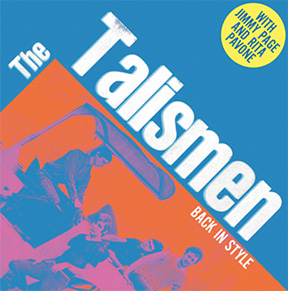
So what has become of the various Talismen members in the 21st century? Guitarist Steve Outhwaite took his Liverpool University gained degree to America and settled there with his wife and family. He now heads a division of a multi-national electronics company there. George Rainsford has now retired and lives quietly in France. Following a large period of his post Talismen life connected with the glass and glazing industry, Trevor Cook now lives in retirement with his wife and drums on the Spanish island of Tenerife.
Meanwhile, bass-player Clive Devine continues to live in Cheltenham with his family and until around 2006 he successfuly owned and ran The Jazz & Blues Cafe in the town. Clive occasionally keeps his musical hand in playing with local bands including the Sixties and Seventies music playing band ROCKology (see link below).
During May 2004 the original line-up of the Talismen plus Alan Dike reunited briefly in their hometown of Cheltenham to play at a "surprise" 60th party for drummer Trevor Cook and a one-off show at Clive's Jazz & Blues Cafe the following lunchtime.
This biography of The Talismen was written by Chris Stanbury with assistance from Clive Devine. BrumBeat.net would like to thank Chris for permission to show the bio exclusively on this web site along with images supplied by original group member Clive Devine.
Copyright © Chris Stanbury 2009
The Talismen 1960s Record Releases
Singles:
Albums:
To see a review of The Talismen 'Back In Style' CD click HERE
Visit the official web site of The Talismen at: www.thetalismen.co.uk
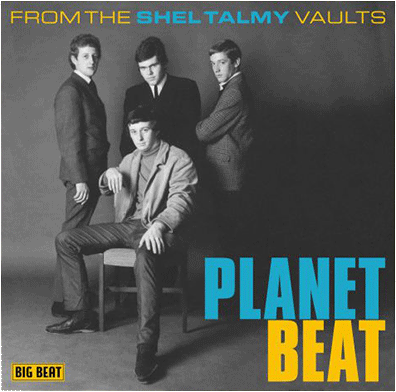
Planet Beat CD featuring rare recordings of 1960s groups by Shel Talmy is also now available.
Clive Devine's ROCKOLOGY web site by Chris Stanbury can be seen at: www.rockology.co.uk